#korean movies
There’s an expression, 把你这猢狲剥皮锉骨,将神魂贬在九幽之处 – “chop up your bones and banish your soul to the Ninth Hell.” According to many descriptions of Diyu (地獄), the punitive form of afterlife in many Chinese and Chinese diasporic Buddhist cultures, this is what happens to souls in the ninth level. It’s a punishment for spreading gossip.
The clip is from the Korean horror comedy 구미호 / FOX WITH NINE TAILS (1994, D: Park Heon-soo).
directed by Lee Soo-yeon (Secret Forest), starring veteran actors Jo Jin-woong (The Handmaiden, Signal) and Shin Gu, Bluebeard was a film I really wanted to like. but unlike other Korean thrillers that I had watched before (Door Lock,The Truth Beneath), the suspense in Bluebeard never eventually took off and instead felt like such a letdown.
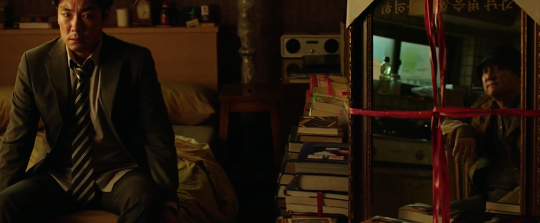
Bluebeard is a character study with an unreliable narrator. having failed at operating his own clinic in Gangnam, Dr Byun (a fantastic Jo Jin-woong) relocates to Hwaseong, Gyeonggi-do and frequently conducts endoscopies for elderly patients. the choice of Hwaseong is no coincidence - it is where the notorious Gyeonggi serial murders, a case that was cold for ~15 years, took place. when Dr Byun, a fan of mystery conspiracies, notices his neighbouring butchers’ suspicious behaviour, he begins to suspect that the recent disappearances and the 15 year old serial murders are relate to them.
at 2 hours’ long, it is quite disappointing that we spent a good 1 hour lingering in Jo’s perspective, when we knew that eventually we will be presented the flipside. and while typically one is surprised with alternative perspectives when the unreliable narrator is revealed, there was surprisingly little tension or anything gripping during the revelation. the twists were either obvious or weak - we didn’t need 1.5h to know that the head in the black bag was a lamb’s head, and i didn’t care that the supposed detective was actually Jo’s senior. the second plot twist at the last 5 minutes of the film was even more unnecessary - *spoilers ahead* what was the point of adjusting the story such that the first filipino wife was actually not killed, Jo had actually killed his creditor, and the butchers had actually killed Jo’s wife?!
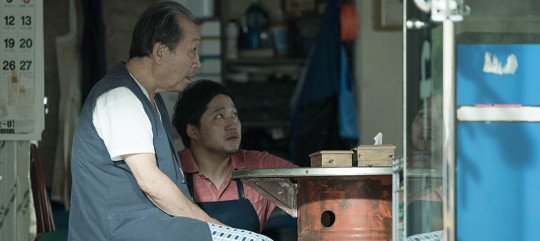
Bluebeardsets out many plot turns and red herrings, but doesn’t execute any of them to satisfaction. Kim Dae-myung (Hospital Playlist), Lee Chung-ah & Song Yoon-ah (Sky Castle) feature in supporting roles too, but the film’s saving grace is undoubtedly Jo, who displayed fine detail and emotional range. –5/10
i knew this film was going to be depressing. depicting the quotidian everyday of a housewife’s life, kim jiyoung, born 1982 sheds light on the daily injustices women face. even if the daily injustice is on its own tolerable, the accumulation of tiny cuts can suddenly make life unbearable.
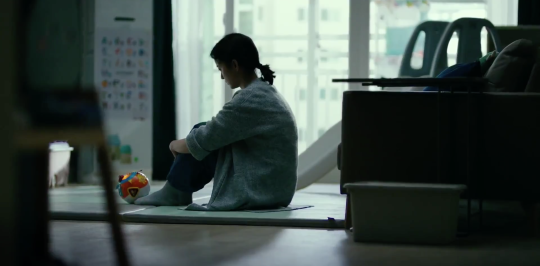
jiyoung, played by the reliable jung yumi, is not okay. she is chronically depressed, constantly aggravated by the marital bliss that surrounds her and that she is expected to feel grateful for. in trying to meet societal expectations of her as a daughter-in-law, a wife, a mother, a daughter, jiyoung loses her sense of self and the courage to pursue her dreams. jiyoung summarises this the best at the end of the film, where she tells her therapist, “sometimes i am filled with gratefulness and joy when i look at my family and the love around me. but sometimes this suddenly makes me feel trapped. i try to escape, but i run into a wall every route that i take.”
none of the micro-aggressions of gender inequality surprised me in this film. none at all - if it surprised you, you probably belong to the privileged group that society’s structure protects. from how jiyoung’s father tells her to cover up more to prevent boys, who cannot help themselves, from sexually harassing her, to how jiyoung’s mother-in-law’s kneejerk reaction against her son going on childcare leave, to how jiyoung’s girlboss mentor at work had to retaliate against a chauvinistic colleague indirectly through a joke. these are ordinary incidents that happen every day, every where. it’s only now that it’s captured in excruciating detail in film.
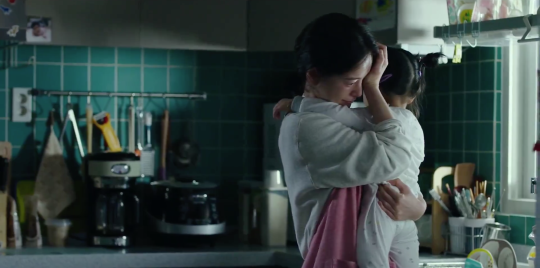
and this is not to blame men. yes, yes, not all men. and definitely not gong yoo, who shows us that even husbands with the best intentions can fall short, as they are inhibited by the inevitable unawareness by not being birthed as females. when jiyoung was upset by his family’s pressure on them to give birth to kids, his (well-meaning) response was “let’s just do it - we have to do it anyway, so why not do it now? i’ll be good. i’ll come back early, i’ll help change diapers, i’ll earn money.” when jiyoung replies “but things will change for me. i will feel suffocated”, he doesn’t understand, and not for the lack of trying. but because he continually tries to put himself his wife’s shoes, he finally does somewhat understand the sacrifices she has had to make, and starts making them in return.
does this film provide any resolution? apart from demonstrating the importance of men stepping up in the household, i saw two ‘outs’ that the film posited. (i) women should continually to press at pockets of opportunity they are presented with, and (ii) other women should have their backs when they are doing so, even when their sons eventually marry the women they love.
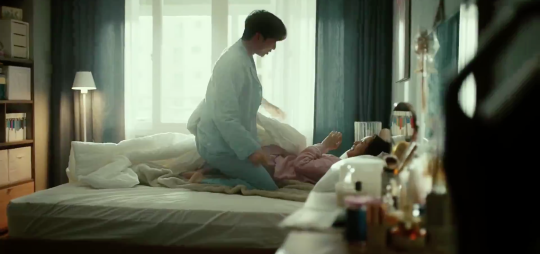
if i were to put a stern critic’s hat on, this film would be an 8-9, because the source material was already so strong and cemented in reality that botching the adaptation would’ve been harder than pulling it off. but because i can’t think of another film that so realistically portrays the modern woman’s uphill challenges, kim jiyoung, born 1982, to me, deserves a place amongst korean film classics.
when the book first released in korea, and later the movie, it gathered a lot of controversy. many keyboard warriors reprimanded the book for inciting societal instability and promoting feminism, and even burned photos of celebrities who had endorsed this book. casting gong yoo and jung yumi was a conscious decision to give this film and its feminist perspective a larger voice, but even gong and jung weren’t spared, and to date the book continues to rile up the anti-feminists. this simply shows that the film’s ending is optimistic and rare in reality, and that we have a long way to go in holding the hands of the many kim jiyoungs that exist in your society and mine. –9/10
films are so much more enjoyable when you are in the right mood for them. a coronavirus-induced lockdown and some career changes has made me contemplative and yearning for something to anchor on. which is why little forest was especially delightful to watch.
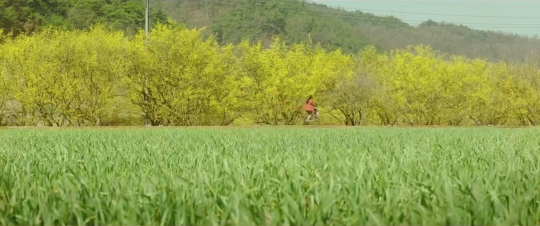
inlittle forest, kim tae-ri plays hye-won, who returns to her rural hometown after failing to become a teacher in seoul. although she initially claims to only stay for “four days or so”, she stays through the four seasons while doing farm work, reconnecting with her childhood friends, and reconciling with the bittersweet memories of her mother, who had suddenly left her when she was in high school.
little forest does a brilliant job of advertising simple countryside living. while some parts did come across as unrealistic, i must admit that i was compelled. often city dwellers over-compensate to find some grounding and resonance with countryside living (pottery, homemade kombucha and cold brew teas are only some examples). but in the world where hye-won and her friends live in, this way of life is modestly taken as daily routine. we see hye-won’s home warmly furnished with handmade wheel-thrown wares, well-stocked with muslin cloth and mason jars, and i cannot lie that i felt no jealousy.

more so than others, food featured strongly in this film. little forest fed us with many recipes that comprised only natural ingredients across the four seasons - potato bread, azuki bean-topped rice flour pancakes, plain-fried cabbage with sujebi. (i am sure there is a compilation of little forest recipes somewhere on the web.) when hye-won winces remembering the convenience store bentos she ate while living in seoul, i winced with her too, knowing just how industrial those could taste. crucially, hye-won’s passion for authentic natural cooking is imparted from her mother; while she reconnects with countryside cooking, she is forced to face the memories of her mother in the kitchen.
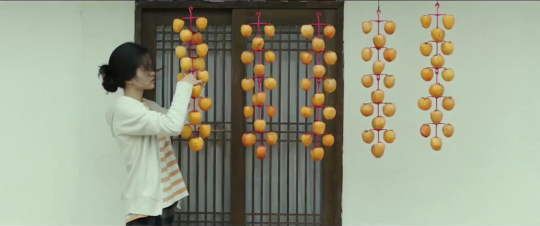
what resonated the most with me was the farming practice of ‘field planting’. i am not sure of the exact english term, but in essence it refers to the transferring of germinated seeds from a smaller environment to a larger one, so the seeds are given more space to grow. jae-ha (ryu joon-yeol’s character) had quit his job in seoul to return to farming in the countryside, and he explained to hye-won, “i left because i do not want to live a life set up by others. in the workplace i am rarely given the space to act freely. i am just waiting for payday. what was the meaning in that?” while it could sound flippant and romanticised, i resonated especially with that sentiment because of the recent career changes that i made. when jae-ha called hye-won out, that she was just keeping busy to avoid having to think about bigger problems, i even teared because it was as if he was talking about me and the everyday. where is my space to settle and grow?
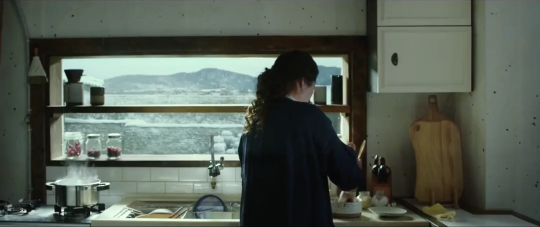
little forest felt so japanese in tone (unsurprisingly so, since the source material was a japanese book of the same name), which i enjoyed because i like japanese fiction. in fact, this film reminded me in particular of the travelling cat chronicles, because both the book and this film lusciously depicted the beauty of the seasons in the countryside. regardless of setting, though, i think the strength of little forest lies in that its themes and heart is universal and easily transposable. who doesn’t, even occasionally, yearn for a simpler routine, a meaningful existence, and catharsis?
little forest is probably the second korean film to move me on a personal level, after house of hummingbird. and unsurprisingly so too, because they are both helmed by female directors. i am always looking forward to more films by female filmmakers, and while i hadn’t heard of this director before, her other films look very interesting and sensitive, so they will definitely be checked out soon. if you are a fan of korean entertainment in general, you’d be able to recognise certain actor favourites (kim tae-ri, moon so-ri, ryu joon-yeol, jin ki-joo). this film probably also contributed to the rising popularity of camping in korea, as well as variety shows such as little cabin in the woods.
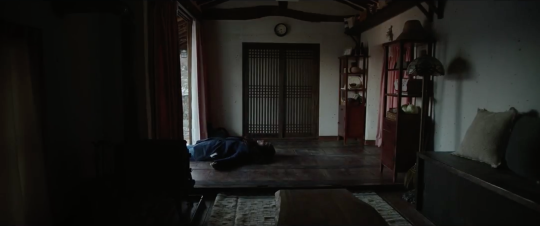
i’d encourage people to watch this - lockdown or not, but even more so during lockdown. it may lead you to look harder for the simple comforts that already exist within your homes, or it may lead you to re-examine something more. – 9/10
i decided to watch a hard day, being a fan of jo jin-woong and lee sun-kyun, and seeing how it had multiple cannes accolades.

a hard day is about a corrupt cop (lee sun-kyun) who extorts money and an even more corrupt cop (jo jin-woong) who smuggles and distributes drugs in illegally-run nightclubs. when lee sun-kyun accidentally hits and buries a man jo jin-woong is after, lee finds himself threatened by jo, who forces him to unearth and deliver the wanted man.
as you can probably guess from the above description, most of what happens in this film doesn’t re-invent the wheel of this genre. except for the fact that lee had buried the man together with his mother in her coffin, and the sequence that led to that joint burial was ingenious. lee, who had dumped the body bag in his car trunk, had to somehow move the body to the hospital morgue and then into his mother’s coffin, all in 15 minutes. this borderline ridiculous act is achieved by connecting the body bag and his daughter’s radio-controlled toy with a string, then using the toy’s remote to pull the string - and later the body bag - through the hospital’s vents. by keeping the scenes fast-paced with little elaboration, the director (who also directed netflix’s kingdom) forces the viewer to keep up.
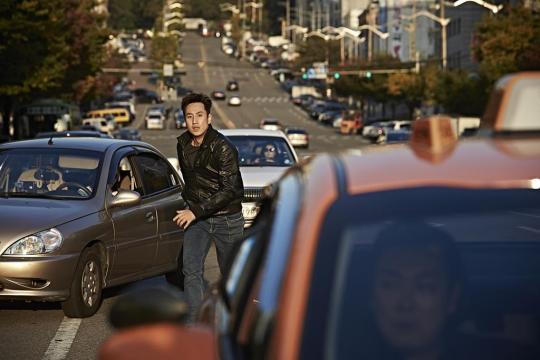
granted, there are there small bits of typical korean film humour in a hard day (e.g. jo assaulting lee in the office on the pretext of “oh i thought he was someone else”, lee half-heartedly investigating the hit-and-run case he had committed). but these moments fell somewhat flat, and do not contribute to the movie’s tone. instead, the director’s willingness to move the plot along quickly made a hard day a much more pleasant watch.
unfortunately i think action thrillers about corrupt cops are, by nature, fairly limited in plot content and character development. as films of this genre go, it does an above average job by keeping the pace fast and action scenes taut. – 7/10
i don’t typically watch heist movies - but the lineup was enough to sway me. park hae soo (who is here way hotter than i remembered him to be), lee jae hoon (that nose), ahn jae hong (indie film darling), choi woo shik (now of parasite fame), and park jung min. speak no more.
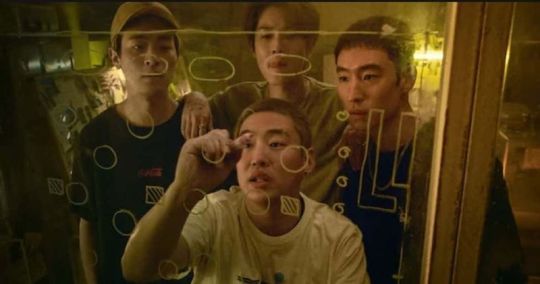
set in a dystopian korea that is socioeconomically torn apart, lee, choi, and ahn rob a mafia-run illegal gambling den in hopes of immigrating to kenting, where they dream of leading peaceful and ordinary lives. when their theft results in a bounty hunter being set upon them, they spend the rest of their lives being haunted (and we spend the remaining 90 minutes of the film breathless). and of course, many gunshots are fired and people died. oh, and the film sets itself up for a sequel as well.
the outstanding strength of the film was really its creation of this version of a dystopian korea. in time to hunt, korea is economically destroyed by strict IMF reforms, which had resulted in immense depreciation of the korean won and surging youth unemployment. for those unfamiliar, s korea took a loan from IMF after the 1997 asian financial crisis, and in return IMF implemented strict reforms that many had perceived as punitive and crippling to the efforts of a nation that was trying to repay its debts. the 1997 asian financial crisis & the IMF situation after did result in many locals losing their jobs, and significantly affected the national psyche so much so that ordinary folks pawned their gold items in order to help the nation repay its debts. so it was interesting to see a dystopian world spun off from this point in economic history.
the scenes of grimy streets and ample graffiti (which ironically are not in hanja) reminded me of the Bronx and some parts of Berlin. there was no youthful exuberance that typically exist in korean films; the men had dreadlocks, are decked in retro sports jackets, and groove to hiphop over cigarettes on rooftops. in some ways time to hunt did perform an offensive caricature on european poverty, but it was unique enough to see this in a korean setting that i could overlook this.
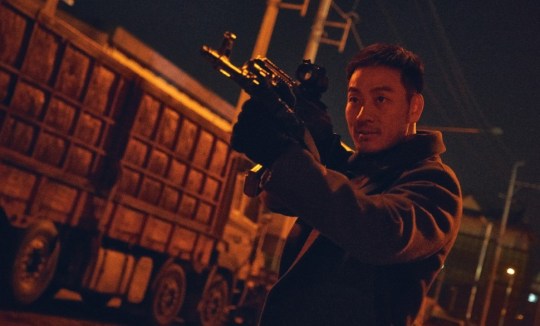
another interesting element of this setup is the futuristic state surveillance. sometimes the props of this state surveillance seem a little childish (maybe they could’ve hired better UX designers, because some of the “surveillance screens” resemble running man videos). but it is also slightly incongruous that in a nation so socioeconomically ravaged, that money was spent on fortifying state surveillance - unless that really is the point. i also didn’t get much background to park’s bounty hunter character, apart for the fact that he’s a really good sniper and has really good political connections. why? what made him this way? park fired at least 5 shots for every word he said, and it’d be far more interesting if park offered lee a job to join him as a bounty hunter.
this film was technically brilliant - suspense was sustained till the end, although some areas were overdone to achieve this suspense. the overpowering red (yes we get it, red is the colour of danger and the colour of sunsets), the all-consuming mist (yes this is a foreign world), the background thrum (this gets old at some point right?). what irked me the most was the rendering of dark colours, which seemed to have an effect that resembled comic book pop colouring. i also enjoyed the character development of the trio; perhaps because i really like these actors, i could relate to them and their depressing coming-of-age realism. although i wish it were bolder in concept and more moderate in execution, time to hunt pushes the boundaries of heist movies and is sufficiently star-powered. –7.5/10
a fallen pilot from the american allied forces, two south korean escaped soldiers, and three north korean guerrilla soldiers coincidentally meet in a secluded village called dongmakgol, where its villagers have never seen a gun or heard of the ongoing korean war - what could possibly happen?

what takes place in the next 2 hours of screentime is a lovely mix of comedy, drama, wartime violence, nostalgia, and heartwarming relationships that makes welcome to dongmakgol one of the better reunification films i’ve seen thus far.
what really distinguishes welcome to dongmakgol from other war films, though, apart from the creation of dongmakgol itself, is the injection of absurd comedic moments (as the koreans might say, gags) that had me chuckling in my seat. those who watched the film would know - from the explosion of popcorn to the guerrilla soldiers wasting their ammunition on killing snakes - and in some way this resembles bong’s trademark casual juxtaposition of comedic moments and grave topics. yet what welcome to dongmakgol did not neglect to do was to emphasise the severe trauma war could cause soldiers, regardless of which side of the fence they stood on. to this, i found the ensemble acting so solid i felt for every character, even the unnamed villagers. it was also a pleasure to see young jung jae-young (!!), shin ha-kyun, and kang hye-jung.

its ending, where the north and korean soldiers leave dongmakgol to create a decoy base to prevent the american forces from bombing the village, definitely brought a tear to my eye. as did the departure scene, where the dongmakgol villagers - not knowing the magnitude of the soldiers’ sacrifice - weep goodbye to the strangers they had sincerely welcomed and taken care of. ultimately, i think welcome to dongmakgol is at heart a pacifist film, with dongmakgol representing a pre-war simplicity and innocence that both sides (and the director) yearn for.
(i was surprised by how explicitly anti-american certain scenes were, especially in depicting american soldiers’ disregard towards bombing potential communist bases, despite risking civilian lives. interestingly, this film was released around the same time as the host - and forms part of the anti-american zeitgeist of the early 2000s, while shedding light on foreign forces’ brutality during the war.)

tonally,welcome to dongmakgol reminded me of studio ghibli films, notably grave of the fireflies. this was achieved most ostensibly through joe hisashi’s music, which create a surreal and mystical atmosphere for the village. the stone figures / masks that decorate the paths leading to dongmakgol, or the appearance of butterflies whenever wartime weapons threaten to disrupt dongmakgol’s peace further emphasised the simplicity of dongmakgol and its connection with nature. the replacement of the symbols of wartime brutality with symbols of nature was a genius move - even the depiction of american bombs resembled fireworks.
welcome to dongmakgol, all the while placing the severity of war square centre, uses its artistic license to create an extraordinary, light-hearted tale of the korean war. it may seem like a cluttered film from afar, but it’s a surprisingly easy film to like and feel for. – 9/10
lee chang dong parades his literary roots in burning, which blends murakami’s barn burning and faulkner’s barn burning to create a wholeheartedly korean tour de force. absolutely insane.

the film starts off with an unemployed and hapless jeong-soo (yoo ah-in), who is working side jobs to make ends meet but dreams of being a novel writer. he meets his paju childhood friend hye-mi (jeon jong seo makes her grand debut), who is a free-spirit compelled by a “greater hunger” for self-actualisation and fulfilment in life. jeong-soo and hye-mi begin an intimate relationship, which comes under threat when hye-mi returns from a trip to africa with her new friend ben (steven yeun). ben, with his wealth and generous personality, seems better able to materially and emotionally provide for hye-mi than jeong-soo, who stays in a humble farm and is often caught off guard by her unusual behaviour.
but the film maintains a veiled sense of danger around ben and his apparent perfection, which is verified at the halfway mark, when ben reveals to jeong-soo his arsonist hobby of burning barns (or in this case - to localise to rural korea - greenhouses). ben lets in to jeong-soo that he burns barns once every two months, “a good pace”, and he’s decided that he would burn a barn near to jeong-soo very, very soon. jeong-soo, while also trying to find a vanished hye-mi, obsessively checks on the barns near him but even after a month no barns seem to be burning or have burned. when questioned, ben enigmatically advises jeong-soo that “sometimes you don’t see the barns that are closest to you”, and states that he had indeed burnt the barn 1 or 2 days after they last met, coinciding with the date of hye-mi’s disappearance.
jeong-soo begins to suspect that ben’s “barns” are not real barns, and his suspicions are further confirmed when he finds hye-mi’s watch in a drawer of random women’s accessories and hye-mi’s cat in ben’s apartment. luring ben to paju, jeong-soo stabs him with a knife, dumps his body in his porsche, douses the car in fuel, and sets it on fire.

the film is devoted in its adherence to murakami’s plot, but builds its characters with reference to faulkner and fitzgerald. jeong-soo’s character is constructed from both murakami’s and faulkner’s barn burning’s; his socioeconomic background and relationship with his father models faulkner’s protagonist’s, while aspiring to be the successful writer in murakami’s. ben’s character embodies the wealth of murakami’s accomplished protagonist with the dandy behaviour of fitzgerald’s gatsby. i found yoo’s performance as the insecure and genuine jeong-soo very stable and confident, and was surprised by steven yeun’s effortless transition into korean cinema. jeon jong-seo, who naturally possesses an air of mystery and lackadaisical rumination, must have made such a splash into chungmuro with this debut performance as well.
i really liked that lee chang dong, while creating the mix of characters across literary works, had managed to weave in a subtle but heavy critique of class inequality. lee makes clear to us that ben’s and jeong-soo’s worlds are clearly different - ben’s porsche in the fields of paju is as incongruous as jeong-soo’s white lorry in the hills of gangnam. ben’s generosity to jeong-soo and hyemi is also always twinged with a condescension that only the rich can afford.
ben’s insincere treatment to the poor is most obvious in his choice and treatment of his muses. his muses are always from lower socioeconomic backgrounds - hyemi worked parttime as a hostess at a shop event, and his next muse works as an assistant at a duty-free store that caters to chinese tourists. and he parades his muses in front of his circle of well-off friends, who goads hyemi to demonstrate the african “greater hunger” dance and encourages his next muse to talk about her disregard towards chinese tourists. the friends’ expressions belie holier-than-thou attitudes that mock the girls’ self-perceived worldliness, resting in the comfort of their gangnam homes that they would never need to encounter african salvation or chinese tourists. i found the echoing of these scenes (hyemi & his next muse) really effective - it hit home how deeply entrenched class divide is, beyond the superficial niceties exchanged between the rich and the poor. if parasite was a movie that delivered an absurdist criticism of class inequality, burning is a film that packs a subtle, realistic, and equal punch.

what i felt was a slight weakness to the film was the lack of development of hye-mi’s character. hye-mi’s character is a familiar one - the manic pixie girl whose gripes with life effortlessly charm the men she meets - and her easy servitude to ben was slightly off-putting. but her role, i guess, was a plot device meant to draw out larger themes in the film (e.g. hyemi is just one of the many poor girls that the rich play with, just as “there are many barns in korea’s countryside). more importantly, hye-mi’s unreliable character and her pantomime hobby - which bridges the real and the imagined, the present and the absent - weaves together themes of questioned memory and loss. is the tangerine real? does her cat exist? was there a well, and if yes did she fall into it? where.. is she?
as the film ends with jeong-soo’s gruesome act, we are reminded of hye-mi’s words at the beginning. she mimes peeling a tangerine to jeong-soo, who praises her. “you know why i am so good at it? the trick is to not think about whether the tangerine is present or not, but to not think about the tangerine at all.” – 9.5/10
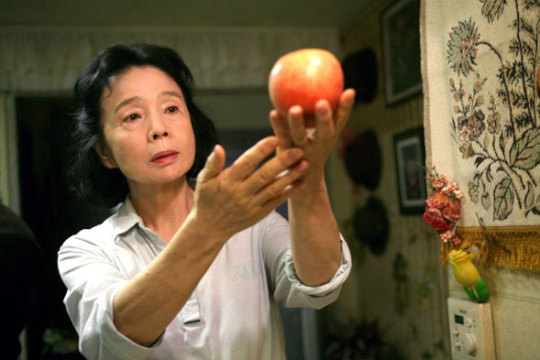
poetry closely follows the life of Mi-ja (portrayed by Yoon Jeong-hee), who raises her only grandson who is in high-school. leading a humble life, she earns a partial income by cleaning for a well-off old man who had suffered from a stroke, and goes to poetry class after being diagnosed with alzheimer’s. there are 2 main plot lines in poetry - that of Mi-ja re-encountering poetry and reconnecting with her thoughts and the words that have seemed to slip by, and that of the sexual assault conducted by her grandson and his friends on their classmate, resulting in the classmate’s suicide.
i watched the film anticipating only the first plot line, expecting a bittersweet reflection of an old lady’s life reignited through poetry, and the beautiful flowering of a new phase of life enabled by poetry. but while the 2 plotlines were kept relatively distinct throughout the film, we observe how the former provides Mi-ja with an escape and coping mechanism to deal with the gravity of the latter. for instance, encouraged by her poetry tutor to really observe the world around her, Mi-ja gets carried away when talking to the victim’s mother about the countryside’s sweet tangerines and pleasant weather. in another scene, a burly man from her poetry reading club (who turns out to be a policeman) arrives as Mi-ja plays badminton with her grandson in the neighbourhood alley. acting as if there was no gravity moment happening in the background, Mi-ja nonchalantly continues playing badminton with the poetry-reading policeman, as her grandson is taken away in a policecar behind her. she is literally sustained by her engagement with poetry.
but the most significant convergence of the 2 plotlines is the ending. having struggled both with her consciousness as a poet and her conscience as the guardian of a rapist, Mi-ja finally arrives at an internal peace and disappears. against a beautifully arranged series of stills of the neighbourhood places that Mi-ja used to occupy, she narrates the poem that she finally put together. but the victim soon takes over the narration, as the scenes slowly trace the victim’s last day and end with the victim standing over the bridge, right before she jumps into the river. the trauma had provided Mi-ja with the impetus to become a “true poet”, but poetry had also helped her to articulate - and come to terms with - the complicated feelings that she had repressed about her grandson’s sins. just as how the film opened, where an extended shot of the stream’s gradual waves revealed the victim’s dead body, the film ends with an extended shot of the same stream’s waves.

being released a year after Bong’s Mother (and Yoon Jeong-hee winning the same best actress award that Kim Hye-ja did), and both being character studies of old poor women who are protective guardians of dismembered males, it is inevitable that the films draws some comparisons. while Kim Hye-ja’s character veered into histrionics at times, i found Yoon’s character to have been more charitably shaped in that she is given more nuance, conflict, depth, and room to develop. when her son is accused of sexual murder, Kim’s character plunges into a wholehearted self-delusional defence (only to be crushed at the realisation of the truth and her complicity in it). in comparison, Yoon’s character begins with self-denial, inaction, action, empathy with the victim, and finally personal resolution. the stories are slightly different that way - Mother brings light to the dangers of overwrought oedipal impulses that can ultimately incapacitate, while Poetry deprioritises the relationship between grandson and grandmother for the self-actualising relationship Mi-ja develops with herself.
while Mi-ja’s character frustrated me at times, particularly the way she carried herself, i enjoyed the side of her that deeply empathised with the victim. when Mi-ja has sex with the handicapped old man with a stony face and later asks him for money, she is subconsciously comparing her situation with the victim’s, realising that women usually only have an illusion of choice when dealing with men’s sexual devices. when Mi-ja remembers her childhood hopes of being a poet, she is drawing on these long-ago memories while mourning for the victim’s own early end of hopes and dreams.
this is my first film by lee chang dong, and i’m happy to say that i enjoyed the mood and tone of the film. either plotline had the potential to meander and explode into melodramatic territory, but the plotlines diverged and intertwined with such control, and the film always treated Mi-ja with a certain detachedness and delicate subtlety. i find myself more seriously moved by films that appear to not have much action appearing in them; the ability to pack waves of poignant revelations into minimal actions is a level of subtle story-telling that i really appreciate. – 8/10
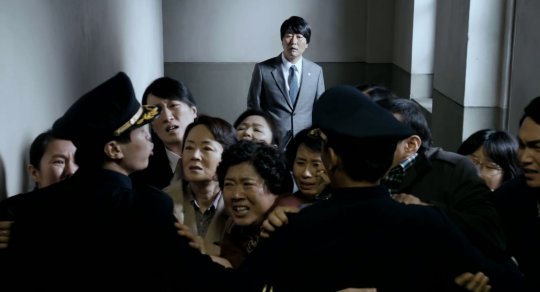
how do you judge a film that centres around a modern historical event & biopic, written for a patriotic domestic audience whose minds are still afresh with emotions of the era?
song kang-ho plays enterprising tax-turned-human rights lawyer sung woo-suk, who is not so discreetly modelled after roh moo hyun, who was also involved in the 1987 uprisings against korea’s then-authoritarian rule and later became the president of korea. the film takes place in 1981, when the spectre of the 1980 gwangju uprising looms large in everyone’s minds. for historical context, the 1980s was a dark period in korea’s history, when korea was ruled by a series of authoritarian and heavy-handed presidents. the images of 1980 gwangju often remind people of tiananmen.
having been treated kindly by an ahjumae who sells gukbapwhen he was a poor construction worker studying to become a lawyer, song sacrifices his lucrative career to defend her son and university students, who have been arrested on the counts of studying contraband literature that promotes socialist unrest. in a plot that closely narrates reality, song sets out to prove the innocence of these university students and expose the inhumane torture methods employed by the police to extract confessions.
there is little room to comment on the plot itself, given that the film is so tightly tethered to historical events (in the same way that i am frustrated by the plot in juror 8). often i find that historical films get more creative leniency when remaking events that happen generations ago (say the age of shadows), or are based on unique strands (a taxi driver). but this film is so wholeheartedly patriotic and historical, that it loses nuance and self-awareness. in an impassioned exchange, the villainous cop instructs song that this is a case of national security, and the law does not apply to national security cases. the camera then closes up on song - “who decides what cases are of national security? you said the country? who constitutes the country? according to the constitution, the country is its people & their freedoms!” tell me this is not a clear appeal to the audience’s patriotism (don’t get me wrong, i actually liked this scene the most.. song’s acting brought tears to my eyes! it’s just in your face)
at 2h 17m, the film lags and drags on at certain moments too. a lot of background-setting around roh/sung, and plenty of police brutality scenes. when you know that there are no surprises round the corner, the scenes become slightly self indulgent.
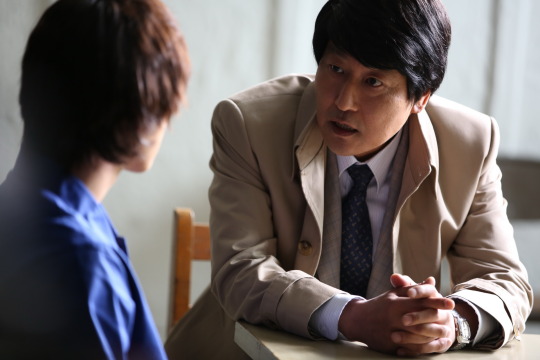
and when historical films like these are made, characterisation is often sacrificed. song tried to imbibe his character with as much depth as possible (the everyman rockstar overcoming inner turmoil with a strong moral compass), and im si-wan did a deft job at portraying the emaciated soulless student. but those familiar with korean history will also know that roh, although very much celebrated as a folk hero through sung, committed suicide in 2009 after intense bribery allegations. given a somewhat divided national memory of roh, this film is uncomfortably generous in its praise and commemoration of his activist legacy. it is fine to celebrate his deeds independently of what he did before or after, but to do so without nuance is slightly irresponsible film-making.
ironically, what i got most out of the film was a critical appreciation of historiography and historical memory in film-making. being a trained historian, seeing e.h. carr’s what is history? accused of instigating fascism provoked a lot of thinking. on one hand, the above is criticism of the film, but on the other, it is a demonstration of how engaged i am with the film’s material. i think there are better films about 1980s korea, but here is a decent one if you need a nationalistic jolt. – 6/10
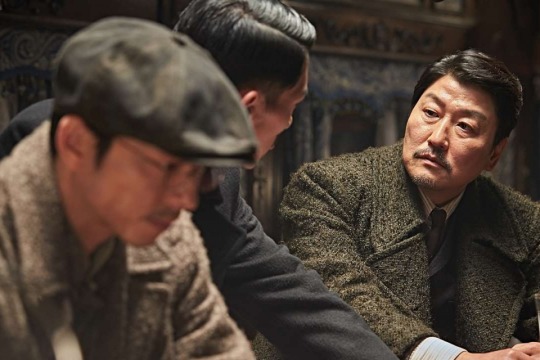
truth is, this was never going to be a genuine oscars foreign film contender (korea’s nomination should’ve been the handmaiden).the age of shadows is a move that delivers on execution but not plot. plot-wise it checks every trick that a double-agent movie could possibly possess, in five acts.
act i- seoul (or gyeongseong / keijo to be more accurate, which was seoul’s name during the japanese occupation). a group of korean rebels are out to import bombs from shanghai to resist japan’s occupation of korea in the 1920s, and two cops with the japanese forces (a deftly assuring Song Kang-ho plays the morally conflicted protagonist, and a scene-stealing Uhm Tae-goo plays the quick-to-anger, caricatured japanese) are tasked to arrest them alive. the cops make contact with the rebels (right hand man Gong Yoo), and the rebels take off to shanghai.
act ii- shanghai, republican china. Song is persuaded by Gongand his boss, leader of the rebel forces (played by Lee Byung-heon, who possibly is the only chungmuro star whose cinematic weight could convince viewers that he outranks SongandGong) to deceive the japanese police to buy the rebels time to export the bombs. Song remindsGong that “I cannot guarantee what form I’ll be in, the next time we meet”.
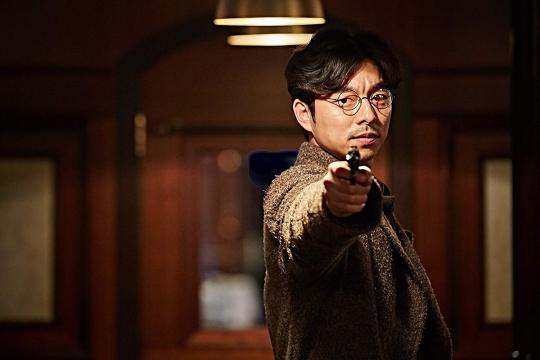
act iii- shanghai express train, and by far, the best act of the film. it is revealed that the rebels’ have a mole in their team, and SongandGong team up to out the mole (Shin Sung-rok).Song proves his loyalty to the rebels and kills Uhm, and parts with “The next time we meet, either I will be dead, you will be dead, or we will both be dead”. ok, we get it.
act iv- arrival back at seoul + bombs. the rebels are caught at the train station. who knew immigration checks could be so intense. Han Ji-min’s character, love interest to Gong’s, is captured and brutally tortured (her bloodcurling scream was genuinely memorable). Song is tasked to lure Gong in to prove his loyalty to the Japanese empire, and soothing lounge music is effectively deployed against objectively heart-wrenching scenes of Japanese forces capturing the other rebels. when asked by an ex-rebel, Songagrees to help Gong, but this turns out to be a trap by the Japanese forces, who had all along doubted Song’s allegiance because of his ethnicity.
act v- at trial, Song denounces his affiliation with the rebels and proclaims loyalty to the Japanese empire, and is acquitted. but this is all part of Gong’s plan, concocted upon realisation of the trap, when he begged Song to never admit his association with the rebels, so that Song could not let the other rebels’ sacrifice go to waste, continue the mission and bomb the japanese unit, which he did. i teared. we end with Lee’svoiceover (to a Korean patriot’s quote, i suspect), “we must step on the bodies that have sacrificed to stand closer to independence.” and Song, who is the only survivor of the attack, replies, “we must see each other again”
i especially enjoyed the film because i was familiar with the historical context and used to the anti-Japanese patriotic double-agent tropes that ever so often appears in korean / chinese films. and i suspect this is why international audiences may flounder slightly more with the convoluted side-switching in the film.
i really enjoyed the richness of the directing and cinematography. the shanghai express train act was very creative - the narrowness of the corridors emphasises the constraints of the rebels as they try to hide, but the lengthy expansiveness of the train itself allowed for the camera to whip back and forth to good storytelling effect. we follow the swivelling camera just as we follow in the confusion of Song,Gong, andUhm as they try to size each other up. i’ve never watched this director’s films before, but the good the bad the weird (affectionately called “nom nom nom” by locals) and i saw the devil have been on my list.
the weakness of the film is obvious. the cast, while pretty and undoubtedly capable, is imbalanced when put to use. Song practically carried the entire film, even patching up the gaps in the script and character development. Gong is charming but i personally think he has still a bit more to go before he becomes a truly charismatic chungmuro lead, in the same way that Song, Lee orYoo Ah-in are.Lee was technically a cameo, but his presence in the 3 extended cameo scenes was so important that it outshone Sung, who i thought was terribly underused in his role as a mole. i personally like Han as an actress a lot, and she pulled off her scenes brilliantly, but i related so little to her death because we had no real backstory.
regardless, once in a while you need a good espionage, double-agent, cat-and-mouse thriller, and the age of shadows delivers just that excellently. i think this is a slicker version of hong kong’s infernal affairs, and should be commended accordingly. –8.5/10
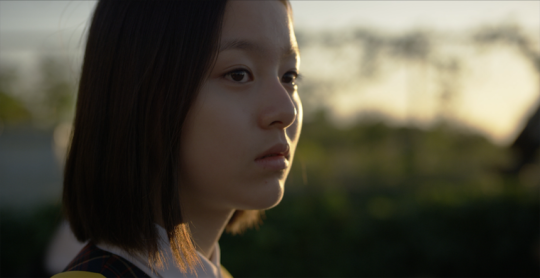
house of hummingbird is a coming-of-age tale of how an ordinary 14 year-old girl finds herself amidst the relationships she develops with the people around her. in doing so, the film draws on themes big and small, which effectively paints a scarred national psyche and depicts the struggles of normal people as they try to keep apace.
the film can be described as a quiet feminist criticism of gender inequality in a “modern” society. eun-hee and her good friend, ji-soo, are victims of domestic abuse by their older brothers, who have been conditioned by patriarchal notions that empower them to assault their sisters as a means of “reprimanding” them and keeping them in order. when eun-hee and ji-soo are caught for shop theft, ji-soo trembles at the fear of being hit by her brother back at home. when eun-hee bravely tells her parents over dinner, in the first third of the film, that her brother had hit her, her older sister gives her a glance. initially i thought the glance was a glance of surprise and reproach, as if to tell eun-hee to remain silent. but i later realise the glance meant that she herself was a victim of her brother’s abuse, and the glance was a pleasant surprise at her courage. the uncomfortable coexistence of domestic assault and women’s education empowerment (the daughters are enrolled for after-school tuition), points to how society’s claims of modernisation will always ring hollow if women cannot even have basic human rights.
the exhortations of gender inequality are constantly woven in the film. eun-hee’s mother knows that her father is having an extramarital affair, but never explicitly addresses it. nonchalantly asking eun-hee “what was your father wearing when he went out today?” and then checking his closet to see whether he wore his best suit out on a date, eun-hee’s mother is the film’s closest representation of the virtuous traditional asian wife. eun-hee almost walks in her mother’s footsteps - even after seeing her boyfriend flirt with her schoolmate, she takes him back immediately with little questioning. it is only with young-ji’s advice that she needs to not live her life passively that eun-hee starts to assert herself and retaliate. when eun-hee is caught for shoplifting, her father tells him he would rather the shopkeeper send eun-hee to the police station than send some rice cakes over as a “favour”. this is in contrast with her father’s treatment of her brother, offering him money to buy burgers to bribe his schoolmates to vote him as school president.
eun-hee’s relationship with yoo-ri, her junior at school, is less significant as an exploration of sexuality but rather an example of how eun-hee is desperately trying to find true companionship in the people around her. contrasting her friendship with ji-soo (they had a falling out but later reconciled) and her relationship with yoo-ri (yoo-ri fell out of affection and ended the relationship coldly), eun-hee learns that lasting relationships need to be built and are hard to come by. this is why her relationship with young-ji, a teacher at her chinese hakwon (after-school tuition), is extra special.
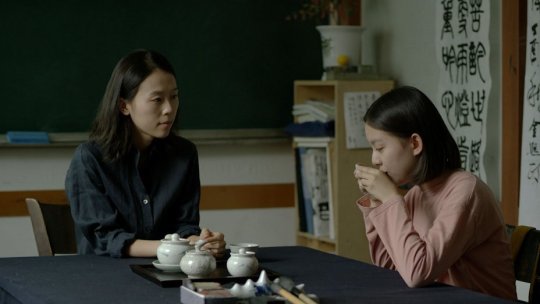
it is easy to see why teacher young-ji is a figure of admiration for the impressionable eun-hee. young-ji lives a quasi-ascetic and independent lifestyle - she dresses in baggy linen, brews oolong tea in a set of china, and in their first meeting teaches eunhee “out of all the people you’ve met in your life, how many of them really know you?” in hanja. she quits her job at the hakwon out of the blue, because she felt like it; she is on a long break from her undergraduate studies at Seoul University, because she felt like it. of course, this independence is afforded by young-ji’s privilege (her family is well-off). but her non-traditional behaviour teaches eun-hee that there are ways to live without conforming to society. she never talks to eun-hee with condescension, but treats her as a mature equal and genuinely cares for her in ways that eun-hee has never received.
in terms of style, i very much appreciated the sensitive directing of kim bora, which drew the viewer very close to the protagonist. there were very clever tricks deployed. there is a moment when eun-hee is caught shoplifting and the shopkeeper asks for her father’s number, to which she whispers “555-2589″. when eun-hee frightfully presses this number into the public phone after she sees the bridge collapse, kim borrows this memory, as the viewer knows who she is calling before she even says a word.
but the best moments were always personal. as a 24 year-old asian female, even the slightest scenes were poignant. when eun-hee ended off her never-delivered letter to young-ji with “when will my life start to shine?” i just started crying, because i wanted to tell eun-hee that her beloved teacher probably doesn’t know. i don’t know too. when the film ended with eun-hee having found an internal peace, through young-ji’s words of advice, that would help her navigate life’s tribulations - big or small - i started to cry again. we have all struggled to find ourselves, amongst the many expectations placed on us in the different roles we play in society. even though not all of us have a figure like young-ji when they were growing up, the answer to finding life tolerable is always the same.
i love this film - i really, really do. i am eun-hee when i was 12, i am young-ji now. i love this film with a camaraderie that is shared between all asian women who have struggled and are struggling to find their places in society. –10/10

a political and family thriller that takes son yejin out of her familiar melodrama territory, the truth beneath centers around a seemingly perfect family that belongs to the top echelons of korean society. when the only child of the family goes missing during the midst of the father’s electoral campaign, son’s perfect housewife is forced to face the cracks in the family and doubt her husband, her daughter, and herself. kim joo hyuk is perfect in his portrayal of the two-faced sleazy husband, and son’s melodramatic chops are deployed to full use in capturing a mother’s desperation anguish. i liked how the film steered us into gritty and gory territory without feeling out of place, and occasionally you just want a film that does suspense right. given the film’s tone and material, what surprised me was that the truth beneath was not directed a man, and i look forward to lee kyoung mi’s next movie. female directors don’t have to film sensitive movies all the time! – 8/10

“Would you make room for my love in the mess of your heart?”
Disclaimer:
I wanted to use this scene of “Swing kids” to illustrate a specific feeling, so please don’t take the phrase too much to heart, it is mine.
Based on a deliciously achieved frame of “Swing kids”, directed by Kang Hyeong-cheol.
